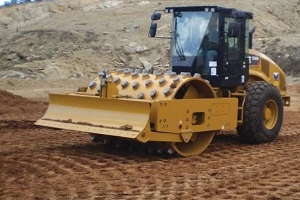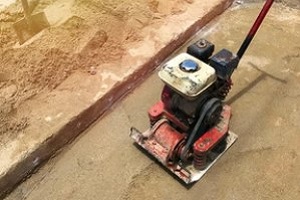Soil compaction and soil consolidation may sound like very similar processes given the fact that they both cause a volume reduction in soil. However, they are achieved in entirely different manners. Here is a look at the specifics of these two soil-related processes.
Defining Soil Compaction And Soil Consolidation
 Soil compaction is a process wherein mechanical pressure is used for compressing the soil mass. This is done with the aim of improving the soil for some purpose, typically construction. Doing this raises the density of the soil.
Soil compaction is a process wherein mechanical pressure is used for compressing the soil mass. This is done with the aim of improving the soil for some purpose, typically construction. Doing this raises the density of the soil.
For example, if you are going to lay asphalt or concrete, compacting the soil will increase its load-bearing capacity as well as its stability. It will also prevent the soil from settling and minimize water seepage. If this isn’t done properly, the road could eventually buckle.
Consolidation, on the other hand, is a process that involves using steady and static pressure to compress saturated soil, which changes its volume. Any time that stress is applied to cause a decrease in the volume of the soil mass due to water, the process is considered consolidation rather than compaction.
Primary consolidation occurs when the soil mass’s volume reduction is achieved through the application of a sustained load on the mass. This is mainly accomplished by squeezing water from the voids within the mass accompanied by transferring the load from the soil’s water to its solids.
Soil is a two-phase material that is made up of soil grains and a pore fluid, which is typically groundwater. When soil that has been saturated with water undergoes a rise in pressure, the high volumetric stiffness of the water compared to the soil matrix will cause the water to absorb the change in pressure initially without changing its volume. This leads to excess water pressure.
Then, as water drains away from the areas of high pressure in the soil’s voids via seepage, the soil matrix, or skeleton, will start to absorb the change in pressure and shrink in volume. This can cause settlements. The process continues until all the excess pore water pressure has dissipated.
Methods Of Compaction And Consolidation
With soil compaction, dynamic loads are applied using rapid mechanical methods such as rolling, vibration and tamping across a small interval. In soil consolidation, the loading is applied in a long interval and is static and sustained.
Therefore, compaction tends to be a far quicker process than consolidation, but this depends on the soil’s permeability and the drainage paths. Consolidation in sandy soils can be rather quick, but it could take many years or decades in a clay soil.
Another difference between the two is the way that soil volume is reduced. Air voids are removed from saturated and dry soil in compaction, whereas the volume is reduced by squeezing pore water out of the saturated soil in consolidation.
Type Of Dirt
The process of soil compaction is mainly used for sandy soil. The two main categories of soil that are suitable for compaction are cohesive soils, such as clay, and granular soils, such as sand. However, the unique characteristics of each one affects its ability to be compacted, as does the moisture content.
When soil has too much or not enough moisture, it is difficult to compact it properly. Ensuring that the soil is not only the right type but also that it contains the proper amount of moisture is essential for creating a strong foundation and making the task of compacting it easier.
Soil consolidation is mostly seen in more clay-like soil. Consolidation may take place because of natural loads, such as sedimentation processes, or it could be achieved via human-made loads, such as constructing a building or embankment above a soil mass. A decrease in the groundwater table can also cause soil consolidation.
Equipment
Soil compaction is carried out using a range of equipment, including rammers, walk-behind rollers, ride-on rollers, trench rollers and forward/reversible plates. The right choice will depend on the type of soil involved; cohesive soils call for trench rollers and rammers, while granular soils are better suited to forward/reversible plates, ride-on rollers, and walk-behind rollers.
Soil consolidation is a more incidental process that occurs in response to the conditions surrounding the soil.
When Are They Used?
Soil compaction is a crucial component of the construction process because it provides a strong working platform that will serve as the foundation for the rest of the project, both during its construction and after the pavement structure has been put in place. Compaction reduces the chances that settlement will occur and cause damage to a roadway, parking lot or building after it has been constructed, which could require expensive repairs.
 It is also used in homes following swimming pool removal. When a pool has been removed from a yard, the empty cavity is typically filled with a clean fill material like soil. When that soil is broken free from the ground, air molecules enter it and cause it to expand.
It is also used in homes following swimming pool removal. When a pool has been removed from a yard, the empty cavity is typically filled with a clean fill material like soil. When that soil is broken free from the ground, air molecules enter it and cause it to expand.
When the pool is backfilled, proper compaction using the right methods and equipment plays a critical role in ensuring the yard is prepared for safe future use and avoiding settlement-related maintenance issues completed on the line.
A trench roller or other type of vibratory soil compactor is typically used for this purpose. If something structural will be placed over the swimming pool cavity, a licensed engineer may need to supervise the work.
Consolidation typically occurs as part of a natural process, and it is often measured prior to designing structures so that they can be engineered in such a way that the settlement is kept at a tolerable limit that will not compromise the structure.
Get In Touch With Dirt Connections
If you are looking for fill dirt for a construction or home improvement project, reach out to Dirt Connections. We provide fill dirt delivery to commercial and residential sites throughout the Northern Virginia area. We can also help with site preparation and advise on matters related to soil compaction and consolidation. Get in touch today to learn more about our professional fill dirt, heavy construction, dump truck hauling and pool removal services.
Summary

Dirt Connections was started with one goal in mind: providing quality residential and commercial construction services to clients on time and on budget. Reach out for more information on how we can support your next project.
For your convenience our estimates are free and by appointment. Call 703-940-9949 for a free estimate today!










































